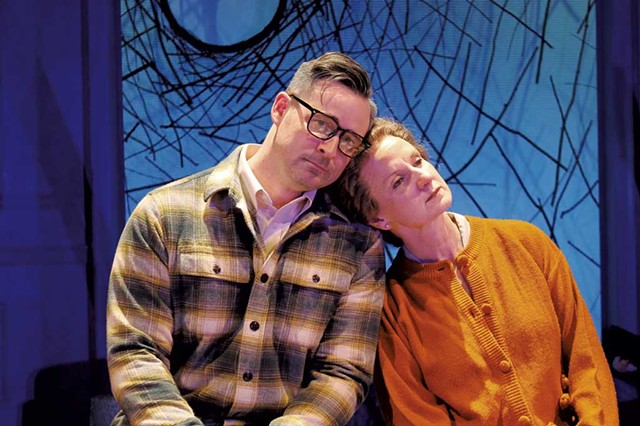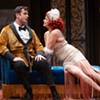Switch to the mobile version of this page.
Vermont's Independent Voice
- News
- Arts+Culture
- Home+Design
- Food
- Cannabis
- Music
- On Screen
- Events
- Jobs
- Obituaries
- Classifieds
- Personals
Browse News
Departments
Browse Arts + Culture
View All
local resources
Browse Food + Drink
View All
Browse Cannabis
View All
-
Culture

'Cannasations' Podcaster Kris Brown Aims to 'Humanize'…
-
True 802

A Burlington Cannabis Shop Plans to Host…
-
Business

Judge Tosses Burlington Cannabiz Owner's Lawsuit
-
Health + Fitness

Vermont's Cannabis Nurse Hotline Answers Health Questions…
-
Business

Waterbury Couple Buy Rare Vermont Cannabis License
Browse Music
View All
Browse On Screen
Browse Events
Browse Classifieds
Browse Personals
-

If you're looking for "I Spys," dating or LTRs, this is your scene.
View Profiles
Special Reports
Pubs+More
Theater Review: 'Dear Elizabeth,' Northern Stage
Published October 24, 2018 at 10:00 a.m.
A letter writer has the time to consider what to say and how to say it. What's gained can be clear expression; what's lost is the immediate give-and-take of conversation. Playwright Sarah Ruhl explores the essence of theatrical interaction in Dear Elizabeth, composed of excerpts from the correspondence of two of the 20th century's most important poets, Elizabeth Bishop and Robert Lowell.
Ruhl accepts the challenge of animating exchanges that primarily don't take place face-to-face. She succeeds by giving ample attention to the few occasions when the characters did meet and by using theater's inherent compression of time to elevate the letters to an expression of the nature of memory itself. Ruhl lets the audience see the connections that arise from the force of character, not from proximity or action.
The Northern Stage production is lively and loose, far from a slow, formal evening of reading aloud. Though the plot contains only a single, entirely respectful dispute and the merest hint of a love story, Ruhl builds energy by focusing on the power of the poets' friendship. Their work occupies them, but their mutual concern for each other is a constant source of solace. This friendship weathers time and the stark differences in their writing styles and gives them a fundamental courage.
The 30-year correspondence between the two was published in 2008 as Words Into Air: The Complete Correspondence Between Elizabeth Bishop and Robert Lowell. Ruhl sifted through those 450 letters to create a script that moves sequentially and briskly through their peak creative years, from 1947 to 1977. Artist biographies often emphasize tabloid fodder, as if trouble could explain genius. Ruhl takes a more illuminating course. If sorrow soaks an artist's work, the work is nonetheless all that matters; in this play, the turbulence Bishop and Lowell faced in real life is the background for their friendship, not the basis for a sensational exposé.
The play skims past biographical drama, presuming the viewer knows the highlights already. Lowell was bipolar and was hospitalized multiple times. He veered through three marriages and became a father late in life. He won the Pulitzer Prize for poetry in 1947 and 1977 and ignited the literary movement of confessional poetry.
Bishop was an alcoholic and never put down roots. She was essentially orphaned after her father died when she was an infant and her mother was institutionalized with mental illness. She was a lesbian and intensely private. During the period covered by the play, her partner was the Brazilian architect Lota de Macedo Soares. Bishop won the Pulitzer Prize for poetry in 1956 and wrote poems that wrapped passion inside formal structure and precise diction.
The play never implies that a messy life is the price to be paid for art. Ruhl is ruthless in keeping the focus on what the two shared in their letters, and in the wrong hands the script could trivialize mental illness and alcoholism. This production, directed by Northern Stage producing artistic director Carol Dunne, skillfully stitches the problems into the characters' lives. Bishop has a bottle in her desk; Lowell lowers himself onto an institutional bed. Monumental struggles become facts without embellishment.
Dunne's staging is filled with movement, but all of it has a pinpoint focus. The characters hold and read physical letters, then drop them haphazardly to the floor. The gentle drift of pages and their accumulation onstage suggests the passage of time.
Lowell and Bishop met rarely, but the play gives these moments prominence, and Dunne stages them beautifully by distilling them into action that achieves the abstraction of memory. When they first meet as distant admirers of each other's work, Lowell, an amateur audiophile, records Bishop reading her poetry. The two actors assume supplicant postures, Lowell offering up his microphone to her, Bishop bending gently toward it. They don't touch; they are almost disembodied by their concentration on capturing her voice.
Dunne is similarly particular in subsequent scenes, elevating small gestures into symbolic statements. She developed her vision for the show while directing it for two actors who performed it in early October in repertory with another show at Northern Stage. In the current run, Dunne plays Bishop, and Thom Miller takes on Lowell.
Miller makes Lowell an earnest, engaging artist, if not a visibly reckless one. Lowell has the larger arc from high to low, and Miller does an admirable job of showing how well he adapts to both extremes, easy in his surrender to incapacity and eager in his work.
Dunne is wry and assured as Bishop, conveying a freedom in her connection with Lowell that she plainly does not permit in other corners of her life. Dunne lets the character weigh how much something will affect her right before it does. Her only false step occurs in reading Bishop's poem "One Art," when she adds drama that Bishop didn't indulge.
Both actors do the work of bringing the letters to life. Reading and reacting to what's being read have equal weight in this vigorous production, and the audience can get lost in exchanges that feel both urgent and airy.
Sound designer Jane Shaw sets the mood, costume designer Hunter Kaczorowski neatly defines the period and lighting designer Jennifer Reiser carves out dozens of moments with light alone. Rebecca Lord-Surratt's scenic design includes some overly fussy elements, like a rotating set of orbs, but lets the characters and their words take prominence.
The play moves from dark to light and back again, skating on a correspondence that defined friendship. As poets, they cannot know the impact of their work as they produce it. Bishop earnestly asks, "When does one begin to write the real poems?" It's a question that defines what it means to examine life while living it, the way a letter writer does.
The original print version of this article was headlined "To the Letter"
Related Locations
-
Barrette Center for the Arts
- 74 Gates St., White River Junction Upper Valley VT 05001
- 43.64809;-72.32021
Got something to say?
Send a letter to the editor
and we'll publish your feedback in print!
Tags: Theater, Dear Elizabeth, Sarah Ruhl, Elizabeth Bishop, Robert Lowell, Barrette Center for the Arts, Video
More By This Author
About The Author

Alex Brown
Bio:
Alex Brown writes fiction (Finding Losses, 2014) and nonfiction (In Print: Text and Type, 1989) and earns a living as a consultant to magazine publishers. She studied filmmaking at NYU and has directed a dozen plays in central Vermont.
Alex Brown writes fiction (Finding Losses, 2014) and nonfiction (In Print: Text and Type, 1989) and earns a living as a consultant to magazine publishers. She studied filmmaking at NYU and has directed a dozen plays in central Vermont.
Speaking of...
-

Theater Review: 'King Lear,' Northern Stage
Jan 29, 2020 -

Theater Review: 'Oslo,' Northern Stage
Sep 26, 2018 -

Show Time: The 2018-19 Vermont Performing Arts Preview
Sep 12, 2018 -

Theater Review: 'Disgraced,' Northern Stage
Mar 7, 2018 -

New Year, New Theater Works: A Roundup of Shows to Come
Jan 17, 2018 - More »
Comments
Comments are closed.
From 2014-2020, Seven Days allowed readers to comment on all stories posted on our website. While we've appreciated the suggestions and insights, right now Seven Days is prioritizing our core mission — producing high-quality, responsible local journalism — over moderating online debates between readers.
To criticize, correct or praise our reporting, please send us a letter to the editor or send us a tip. We’ll check it out and report the results.
Online comments may return when we have better tech tools for managing them. Thanks for reading.
- 1. Amalia Angulo’s Drawings at Kishka Gallery Suggest and Question a 'Peaceable Kingdom' Art Review
- 2. STRUT! Fashion Show Returns After Four-Year Hiatus Culture
- 3. Bianca Stone Named New Vermont Poet Laureate Poetry
- 4. Adam Tendler and the VSO to Premiere Vermont Composer Nico Muhly’s First Piano Concerto Performing Arts
- 5. In ‘Painting the Town,’ Julie Davis Pays Tribute to Johnson Landmarks Art Review
- 6. Shaina Taub's 'Suffs' Earns Six Tony Nominations, Including Best Musical Performing Arts
- 7. Video: Visiting the Wind Phone at the Lanpher Memorial Library in Hyde Park Stuck in Vermont
- 1. How a Vergennes Boatbuilder Is Saving an Endangered Tradition — and Got a Credit in the New 'Shōgun' Culture
- 2. Video: The Champlain Valley Quilt Guild Prepares for Its Biennial Quilt Show Stuck in Vermont
- 3. Waitsfield’s Shaina Taub Arrives on Broadway, Starring in Her Own Musical, ‘Suffs’ Theater
- 4. This Manchester Center Family Is a National Show Horse Powerhouse Animals
- 5. Video: 'Stuck in Vermont' During the Eclipse Stuck in Vermont
- 6. Pet Project: Introducing the Winners of the 2024 Best of the Beasts Pet Photo Contest Animals
- 7. Crossing Paths: An Eclipse Crossword 2024 Solar Eclipse





































